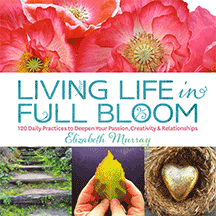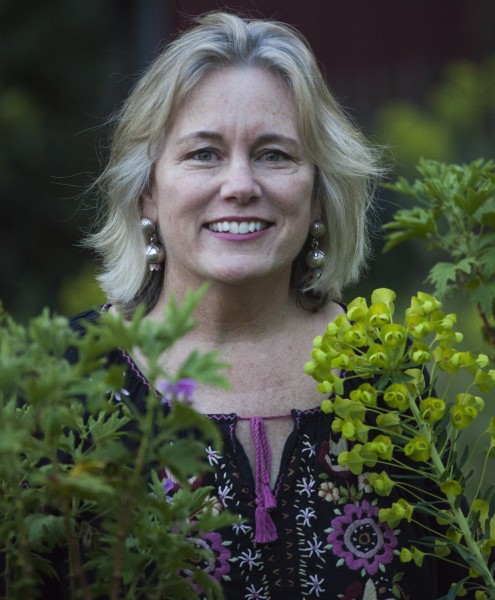In the Garden with Elizabeth Murray
 Elizabeth Murray, author of six books, helped restore Monet’s gardens in France and photographed them for 30 years. She’s also one of two-dozen speakers who will talk about getting our hands in the dirt — literally — as she shares ideas for Radical Collaboration, the theme of the April 24th TEDxSantaCruz event.
Elizabeth Murray, author of six books, helped restore Monet’s gardens in France and photographed them for 30 years. She’s also one of two-dozen speakers who will talk about getting our hands in the dirt — literally — as she shares ideas for Radical Collaboration, the theme of the April 24th TEDxSantaCruz event.
We asked Elizabeth recently about her ideas and her work to get a preview of what she’ll talk about when she comes to town next week.
What does radical collaboration mean to you, and how do you apply it in your life and work?
Elizabeth: Radical collaboration to me is about love — what we love, we value, respect, and protect. It requires going deeper in our heart.
Respect is a willingness to look again, to be in mutual respect and a dance of equals — curious, open, observing, and adjusting. It means new ways of doing things, being bold, looking forward, at least thinking, in 100-year plans or 500-year visions, and making decisions around our natural resources, like forests, oceans, soil, and climate.
What natural systems have been collaborative to get success? Think like a swarm. Look at earth-based cultures for a reference, in collaboration; look at natural systems for models, from soil to bees.
 I have a mutual collaboration with nature in my garden. Only some of what I intend actually happens. But I get surprises, and if I keep a vision but not a strict fixed position on what is right and how it should look or be, I can create something more than I could have imagined.
I have a mutual collaboration with nature in my garden. Only some of what I intend actually happens. But I get surprises, and if I keep a vision but not a strict fixed position on what is right and how it should look or be, I can create something more than I could have imagined.
It’s like working with a team of creatives, not just one director. There is more playfulness and sense of awe.
I find a reverence in the common when I slow down to really look and celebrate the miracle of bulbs sprouting, dormant trees blooming, and seeds ripening into food to eat. I enrich the soil with compost, plant seeds, water, watch, harvest, eat, compost leftovers — all a radical collaboration with nature, all a miracle.
The ordinary is extraordinary every day. This makes me happy, healthy, and full of joy.
What will you be speaking about at TEDxSantaCruz?
Elizabeth: Radical collaboration with nature, through the garden.
Entering the garden gate, we can develop an intimate relationship with nature and fall in love each day. We can discover awe and wonder and the connections of beauty and delight.
What we love, we protect. We are invited to fall in love with nature, realize the miracles and beauty that is under our feet, bring in children to play, and co-create with nature for mutual nurture, health, and happiness. Through the wild yet cultivated garden, we may cooperate rather than control; we are more flexible, welcoming discovery with curiosity.
We adjusted to change of climate, we know our birds, perhaps keep bees, grow some food to have a direct connection, play and create. The slowest of the performing arts, gardens can be the greatest form of art, cultivating all the senses as well as maturing over time. They can be a sanctuary and a place to have a direct relationship with spirit, as in animism.
What can you tell us about yourself — where you live, something about your background and your passions?
Elizabeth: My passions are nature, gardens, art, painting, photography, writing, and children. I love indigenous people and learning their ways of living in harmony, respect and reverence for the earth. I love traveling and time with children, doing art and being in nature.
I was an environmental education teacher, then a full-time gardener. I got certified as a horticultural therapist 35 years ago and wove it into my gardening team.
In 1985 I left Monterey and a successful business to help restore Monet’s gardens in France. I have gone back for 30 years to photograph it for hundreds of calendars, two books, nine museum art shows with Monet’s paintings, and, most recently, Monet’s Garden, a big show at the New York Botanical Garden. The gardens were re-created, many of my photos were exhibited, and 370,000 visitors came.
I teach creativity, write books, and am an artist. My newest book is Living Life in Full Bloom: 120 Daily Practices to Deepen Your Passion, Creativity and Relationships. We all have within us the Gardener for intimacy with nature, the Artist to expand creativity and imagination, the Lover to follow your heart and commit to what you love, and the Spirit-Weaver to bring spirit, celebration, and blessings into each day.
I have loved gardens since childhood and find that the wild and cultivated are the places where I love to be and play. This connects me to spirit, creativity, and love.
Meet Elizabeth at TEDxSantaCruz: Radical Collaboration!
Seats are still available if you get your tickets online now. The fourth-annual local conference will take place from 9 a.m. to 4:30 p.m. at the Rio Theatre, 1205 Soquel Ave., Santa Cruz. Find out more about TEDxSantaCruz on Facebook and Twitter.
